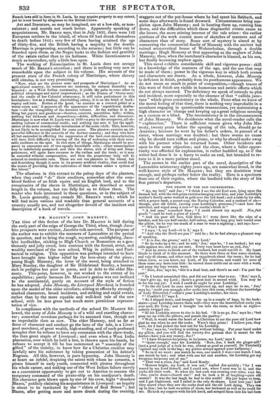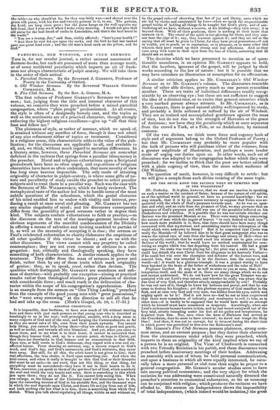DR. MAGINN'S JOHN MANESTY.
THE time of this fiction of the late Dr. MAGINN is laid during the early part of the reign of George the Third, when, though Jaco- bite prospects were extinct, Jacobite talk survived. The purpose of the author was to exhibit the manners of Lancashire at the period in question, and to bring the rough, roystering, cockfighting, Jaco- bite landholder, sticking to High Church or Romanism as a gen- tlemanly and jolly creed, into contrast with the formal, strict, and wealthy merchant of the new school, Whig in politics and Puri- tanical in religion. This opposition was perhaps intended to have been brought into higher relief by the love-story of the piece ; young Hugh Manesty, the lover of the novel, being attached to Mary Stanley, the daughter of Sir Hildebrand Stanley, a baronet rich in pedigree but poor in purse, and in debt to the elder Ma- nesty. This point, however, is not worked to the extent of its capabilities ; partly because Dr. Macular's genius was not inclined to the sentimental, partly on account of the style of fiction he has adopted. John Manesty, the Liverpool Merchant, is founded upon the model of the older novelists; aiming at effects by strongly- marked characters, broad incidents, and striking and rapid events, rather than by the more equable and well-knit tale of the new school, with its less gross but much more pernicious represen- tation of vice.
In compliance with the methods of the school Dr. MAGINN fol- lowed, the story of John Manesty is of a wild and startling charac- ter; somewhat overdone perhaps for its assumed time, though not so improbable then as now. The elder Manesty, and as far as force of character and conduct go the hero of the tale, is a Liver- pool merchant, of great wealth, high standing, and of such professed scruples that he refuses to have any connexion with the slave-trade, the then great staple of Liverpool ; and even when a West India plantation, over which he held a lien, is thrown upon his hands, he refuses to accept it till he has summoned an "assembly of the gifted" of the vicinity, to know how far a Christian creditor may lawfully save his substance by taking possession of his debtor's Negroes. All this, however, is pure hypocrisy. John Manesty is at heart an infidel, despising the saints with whom he consorts, a pirate himself in early youth, connected with pirates throughout his whole career, and making use of the West Indian failure merely as a convenient opportunity to get out to America to assume the temporary command of' the pirate-ship on his coadjutor's death. His character gets blown upon by one of his crew, bight "drunken Blazes," publicly claiming his acquaintance in Liverpool : an inquiry is about to be instituted by the " elders of Seal Street " ; but Blazes, after getting more and more drunk during the evening, staggers out of the pot-house where he had spent his Sabbath, and some days afterwards is found drowned. Circumstances bring sus- picion upon John Manesty ; and in hunting them up, running him down, and the difficulties which these disgraceful events cause to the lovers, the more stirring interest of the tale arises : the earlier portions of the work consist more of sketches of manners and of characters than of story. Some sort of mystery is aimed at by connecting the commercial family of Manesty with the ancient but ruined aristocratical house of Wolsterholme, through a double marriage ; Hugh Manesty at first appearing as the nephew of John Manesty, then, when the merchant's character is blasted, as his sou, but finally becoming nephew again.
This novel exhibits considerable skill and vigorous power : skill in a knowledge of the manners of the age, and the use that may be made of them ; power in the vigorous way in which both scenes and characters are drawn. As a whole, however, John Manesty is deficient in finish, probably from its posthumous appearance. We do not mean so much in point of composition,—though traces of this want of finish are visible in humorous and satiric efforts which do not always succeed. The deficiency we speak of extends to plot and incident, more especially to the absence of that "collide junc- tura " which gives consistency to the whole. From what we know of the moral feeling of that time, there is nothing very improbable in a merchant engaging in questionable transactions, yet maintaining a high character on 'change and keeping up a great religious seeming as a custom or a blind. The inconsistency is in the circumstances of John Manesty. We desiderate what the novel-reader calls the " explanation." There is sufficient reason given why John Ma- nesty, twenty years before the opening of the tale, should go to America ; because he went by his father's orders, in pursuit of a sister, whose marriage was doubted : but there seems no cause why he should turn ruffian and pirate, or why he should make away with his partner when he returned home. Other incidents are open to the same objection ; and the close, where a fuller oppor- tunity was afforded for explanation, is rather huddled up, as if the writer had done it in a hurry to make an end, but intended to re- turn to it in a more patient mood.
The scenes in the earlier part of the novel, descriptive of the Lancashire aristocracy eighty years ago, are somewhat broad, in the well-known style of Dr. MAGINN ; but they are doubtless true enough, and perhaps rather below the reality. Here is a specimen from one of their regales, where the landlord tells the story of his first patron's departure.
THE DEATH OF THE OLD COCKFIGHTER.
"Ay, my lord," said Joe ; "I think I see the old Earl now, lying upon the damask bed, with the rich green curtains hanging over him, and your Lordship's mother's family-arms worked in gold over the bed-head ; and a table by his side, with a prayer-book, a posset-cup, the Racing Calendar, and a tankard of ale— though, poor old fellow, (saving your Lordship's presence,)"—and here Joe snivelled, and wiped away a tear—" he couldn't drink it."
"A bad case," remarked Sam ; "I could almost cry myself. Non fuit qualis "—and he took a glass of punch. "And his poor old face, God bless it ! worn down like the edge of a hatchet, and his eye half-awake, half-asleep, and his long grey hair tossed over the pillow, for he was too much of a man to wear a nightcap ; and says he- "' Who's there ? '
" I says, ' I, my Lord—it is I,' says I. " < And who the Devil are you ? ' said he ; for be had always a pleasant way of speaking.
" It is Joe, the groom,' said I, my Lord.'
" So he woke up a bit ; and he said, ' Joe,' says he, ' I am booked ; bet any odds against me, and you are sure. Every race must have an end, Joe.'
"And he strove to drink out of the tankard, but could not lift it. My heart bleeds to think of it this moment. So there were three or four nurse-tenders, and valy-di-shams, and other such low raggabrash about the room ; for he had taken leave, as you know, my Lord, of his relations, and would let none of them come any more near him : he turned these cattle out at once with a word, and away the lazy vermin went. " ' Now, Joe,' says he, 'this is a dead beat, and there's an end : I'm past the post.'
" So I looked astonished-like, and did not know what to say. 'But,' says I, 'don't give up, my Lord ; there's a great deal in second wind. You may be in for the cup yet. I wish I could do aught for your Lordship.' " So the old Lord he once more brightened up, and says he to me, 'Joe,' says he, ' could you smuggle a few cocks into this room, without the knowledge of Lady Silverstick ?'—that's your Lordship's mother, his niece.
" ' Couldn't I !' says I. "So I slipped down, and brought 'em up in a couple of bags, by the back- stairs—your Lordship knows them well—they were the beautifullest cocks you ever seed, Sir Toby ; and I brought 'em into the room, as dark as night— nobody twigged me.
" So his Lordship strove to rise in his bed. It is no go, Joe,' says he ; 'but prop me up with the pillows, and parade the poultry.'
"Well, it would warm the heart of a Christian to see the poor old Lord bow glad he was when he saw the cocks. Wasn't they prime ! I believe you, they were, for I had picked the best out for his Lordship. "Joe,' says he, 'cocking is nothing without betting. Put your hand under my pillow, and you will find the twenty-five guineas that is meant for the doctor—have you any money, Joe?'
I have fivepence-ha'penny, in ba'pence, my Lord,' says I. " Quite enough,' says his Lordship. 'Now, Joe, I back the ginger-pill' (and a good judge of a cock he was, almost as good as yourself, Sir Tlieobald) 'against any cock in the bag; my guinea always against your halfpenny.' " So to it we went : one match he won, one match I won—one match I lost, one match he lost ; and what with one bet and another, his Lordship got my fivepence-ha'penny out of me."
"That was a cross, Joe," said Lord Randy.
"Honour bright, my Lord, it was not," replied Joe quickly ; "for I MU reared by my Lord himself, and I could not, when I once was in it, and the cocks did their work. So when bis last cock was crowing over mine, says he. 'Joe, you're done—cleared out l' and he took a fit of laughing—poor old master! It was the last laugh he had in this world! His jaw began to drop, and I got frightened, and I called in the valy-di-shams. Lord love you how they stared when they saw the cocks dead and the old Lord dying. They nus up to him ; but he took no notice of them, but beckoned as well as he could for me. He took my coppers with his left hand, and scraped them into his bed front
the table—as why should'nt he, for they was fairly won—and shoved over the green silk purse, with his five.and-twenty guineas in it, to me. The guineas, my Lord, are long since gone ; but the purse hangs on the wall opposite my bed-head, that I may see it when I wake every morning. I would not give that old purse for the best breed of cocks in Lancashire, and that's the best breed in the world."
"You are a trump, Joe," said Sam, visibly affected; "here's your health !" "And then he cast his eye upon the cocks, and the bird he had last backed gave one great loud crow ; and the old man's head sunk on the pillow, and he died."



























 Previous page
Previous page